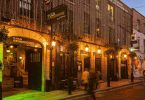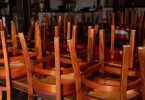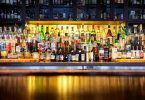Options 4 Recovery launched at 38th VFI AGM
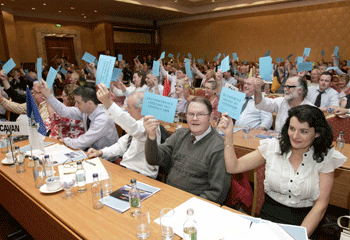
Amongst other motions discussed and passed by nearly 300 VFI members at this year’s VFI AGM were those calling for a VAT reduction and the implementation of all parts of the 2008 Intoxicating Liquor Act.
Other matters discussed and debated included cheap alcohol sales, tackling red tape, Mandatory and fraudulent ID cards, the rates burden (VFI Chief Executive Padraig Cribben reckoned that what was needed was "an ‘ICTU’ – … not an ‘IBEC’" for small businesses) and members’ participation – or lack of it – in VFI initiatives such as the roadshows, darts competitions and the Stars of Our Bars promotion.
Former VFI President Michael Moloney pointed out to the conference that one can only pay Local Authority rates and charges from profits. This was the road to go down. There should be a reduction in these charges as profits have shrunk by over 50 per cent “…. And most of us should be on the dole…”.
Enniscorthy’s Joe Doyle pointed out, “Below-cost selling will lead to people on trolleys in hospital car parks through cheap drink – tell the new Health Minister that!”.
Fine Gael had stated in its pre-election literature that it would ban below-costs but so far FG had failed to translate this into action, pointed out Padraig Cribben, adding, “This will be one of the top two things to be pursued by the Federation – cheap alcohol and the cost of doing business in this country.”
The VFI’s Trade Relations Committee Chairman and former VFI President Dick Dunne explained that 2010 had been a difficult year for dealing with suppliers with lower volumes being sold and suppliers themselves under pressure.
In 2009, a report from former President Val Hanley had stated that for the first time there had been no price increase from suppliers.
Dick was glad to report the same again for the second year running when increases had taken place in the UK and NI from the same suppliers.
Reviewed trading terms had made it easier for publicans to reach their growth targets in 2010.
Chair of the VFI’s Member Services/Costs Committee Noreen O’Sullivan pointed out that a five per cent drop in membership during the year to December 2010 could be put down to the difficult trading conditions and Padraig Cribben pointed out that the drop appeared to stabilise in the first four months of 2011.
Greg Gormley from the Louth branch sought help from suppliers with costs for the growing number of ‘ice-cold’ taps which could cost publicans up to €500 a year per tap.
Sean Redmond of Monaghan branch told conference that the cost of producing electricity had gone up by 12 to 15 per cent.
“We can save about 15 per cent on coldroom costs by raising the temperature from three to eight degrees,” he said, adding that the ‘coffin’ system uses around 10 units a day that could be dropped to five. Bottles could be chilled using half-price electricity, he added.
Paul Bell from Tullamore wanted the VFI to lobby the Department of Justice on later opening hours at the weekend for pubs.
“I’ve had nine prosecutions for late-night opening but I’m just trying to pay the mortgage,” he explained.
Noreen O’Sullivan of Nenagh wanted the VFI to pursue a change in legislation to ensure that all new entrants to the on-trade undergo a formal training programme relevant to the trade in advance of receiving a licence from the court. Following some debate, it was passed as was one that the VFI seek to have tobacco removed from licence turnover calculations and another that sought to have opening hours for St Patrick’s Night run on to 12.30am the following morning regardless of the day of the week.
Another motion, that the VFI lobby to ensure that the relevant parts of the 2008 Act on the structural separation of alcohol sales areas in mixed trading outlets and controls on the marketing and advertising of alcohol in mixed trading outlets be enforced, was also passed.
Kildare’s Michael Lambe sought to have the Federation campaign for members to put defibrillators into their pubs.
“This is a motion very close to my heart,” joked the recipient of four jump-starts in three years who got the motion passed.
"It’s about satisfying customers profitably”
This year’s guest speaker, former C&C and Tesco Chief Executive Maurice Pratt, reckoned that the VFI document Options 4 Recovery “was absolutely ‘on the money’”.
He’d spent almost 40 years in Irish commercial life, 10 in marketing, 10 in grocery retailing and eight in the drinks industry.
“I regard myself first and foremost as a marketeer,” he said of his outlook which had led him to believe that you need to have someone representing the customer on any management board.
Businesses that understood customers and how to market to their needs had an advantage.
“It’s about satisfying customers profitably” he explained, “Despite all that’s happened the pub remains part of the fabric of what defines us. It’s in our DNA.
“When we get beyond the fallout of our misbehaviour as a society, we will recover our sociability and the pub will play a prime role here. But it won’t happen by itself. Without nurturing, it will wither on the vine.
“No pub operating satisfactorily today has done so without adapting to present challenges.
“And the challenges faced are by no means unique but are faced by many different businesses.”
He alluded to the pharmacy sector where parallel importing of drugs was also rampant.
Alcohol consumption will continue to decline although not as fast as at present, he predicted, but on- to off-trade drift would continue.
“The strong will survive because they will adapt.
“If suppliers dictate to your business, then they’re the ones who have their hand on the tiller of your business,” he said.
Options 4 Recovery also tackled the value perceptions of pubs.
“Prices are a thorny issue,” he pointed out, “Consumers believe that pricing in pubs has not yet adjusted to the lower financial position consumers find themselves in. They believe that their local was overcharging them in the good times. Whether you were overcharging or not, it’s their perception.”
But, he said, tackling prices in pubs is fundamental to their future prosperity.
“Consumers are cynical of a ‘value improvement’ plan and require a lot longer. Give it a full year,” he advised, adding that even the smallest pub can put together a marketing plan.
“Make use of the ‘facetube’ media, as comedian Peter Kaye called it. For less than €200 you can create your own version of Bud Ice Cold’s marketing campaign. Put it all together in a coherent plan.
“If we improve the value over time, we will recover lost market share. So shift the focus from price to value. Embrace the new tools of communication which are available at low cost. And remember that the positive body language of the proprietor transmits to his staff.”
He believes too that the trade should continue to press for a re-introduction of the ban on below-cost.
The definition of ‘cost’ was set as ’net invoice price’, so retailers sought ‘off-invoice’ pricing from suppliers.
“50 per cent of the trading margins that the Tesco business earned was ‘off-income’,” he told delegates, “50 per cent of sales in Christmas Week came from alcohol in Quinnsworth”.
There are “incredibly strong social arguments” for the re-introduction of the ban, he concluded.
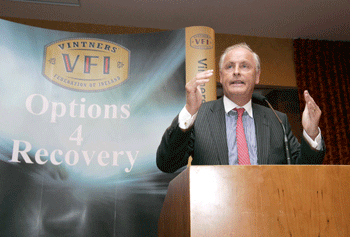
"The pub remains part of the fabric of what defines us. It’s in our DNA" – Mauice Pratt.
“Do It Yourself” urges VFI President
“The last Government undermined our industry at every turn and suppliers have turned their attention to the off-trade.
“If we’re going to save this industry we’re going to have to do it ourselves.”
In his presidential address, VFI President Gerry Mellett reminded members that it was the risk-takers who employ some 700,000 “… and so we cannot throw in the towel, but the banks that we’ve saved are showing very little sympathy to the small business”.
He pointed out that this industry has changed and he believed that it had changed forever.
“But behind every job in our industry there’s a family, so today’s pub must maximise its potential in ways we’d never have thought of before. Why are pubs closed all day? What kind of message are we sending out? Closing during the day does not fulfill the need of the modern consumer. And if we don’t do that, someone else will,” he warned.
Options 4 Recovery
As part of this year’s VFI Conference, the Federation released a new blueprint for the future of the pub trade, Options 4 Recovery, with the aim of helping inject life into the struggling pub industry and help save the 50,000 jobs in the trade.
The majority of pubs simply can’t sustain current sales trends so the VFI spent the last few months gathering the thoughts of its members.
Describing it as “brave and forward-looking”, VFI Chief Executive Padraig Cribben said, “The Options 4 Recovery document challenges publicans to ensure they have the highest standards of service and we are well on the way to doing this with the launch of the recent Fáilte Ireland accreditation scheme”.
He also described as “primarily unjustified” the perception of a lack of value in the pub trade, but one nevertheless which needs to be tackled.
“Publicans must also promote themselves better and get involved in local festivals and events and provide leadership in this area. Pubs play an integral part in the tourism industry which is one of the potential green shoots for economic recovery.”
VFI President Gerry Mellett added, “Publicans need the current Government to reduce the costs of doing business in Ireland to help keep doors open and preserve jobs.
“A total revamp of how Local Authorities are structured and financed is required to significantly reduce the current burden on business. In addition, the Government needs to address the irresponsible practice of below-cost selling of alcohol in supermarkets.
“The VFI firmly believes that with the right policies in place, not only can jobs be saved but jobs can be created.”
Options 4 Recovery focuses on four main areas:
1. Standards: Looking after the Customer
According to the document, “The real opposition today is not the other publicans but the home, the supermarket, the gym, the cinema and any other place the leisure €uro can be spent”. It points to the recently-established Fáilte Ireland Accreditation scheme as one way in which pubs can ensure that they’re best looking after their customers.
2. Value: The Value Perception
There’s a perception in some quarters that the pub is expensive.
“Value is not just price,” states the document, “It also relates to ambience, entertainment and quality of offering – in essence the total experience.”
The notion that pubs are expensive can be put down to a number of factors, most prominently by “a direct comparison with supermarkets for certain products, notably bottled beer and soft drinks” and by our excise regime which is “way higher” than most other European countries.
3. Costs: Remove the Barriers
Many of the costs are regulatory-imposed and outside the control of the individual operator and so the VFI is calling for:-
a. an immediate amendment to the rates legislation to allow for a premises to be re-rated on request
b. a reduction in excessive red tape and bureaucracy
c. an exemption of VRT on seven- and nine-seater buses used for commercial purposes
d. the abolition of the Joint Labour Committee system
e. a more balanced approach to smoking rooms
f. a reduction on the VAT rate to 13.5 per cent on alcohol served in licensed premises
g. the introduction of a minimum price for alcohol based on the
alcohol content of the product.
4. Promotion: Events and Marketing
In seeking how to further drive footfall, the document notes that, “The consumer demand has changed. People need a reason to go out so publicans must provide this reason”.
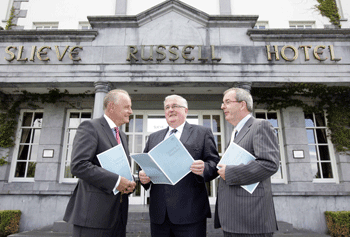
From left: Keynote speaker and former Chief Executive of Quinnsworth, Tesco and the C&C Group Maurice Pratt with VFI President Gerry Mellett and VFI Chief Executive Padraig Cribben at the launch of Options 4 Recovery at the Slieve Russel Hotel, Cavan.





